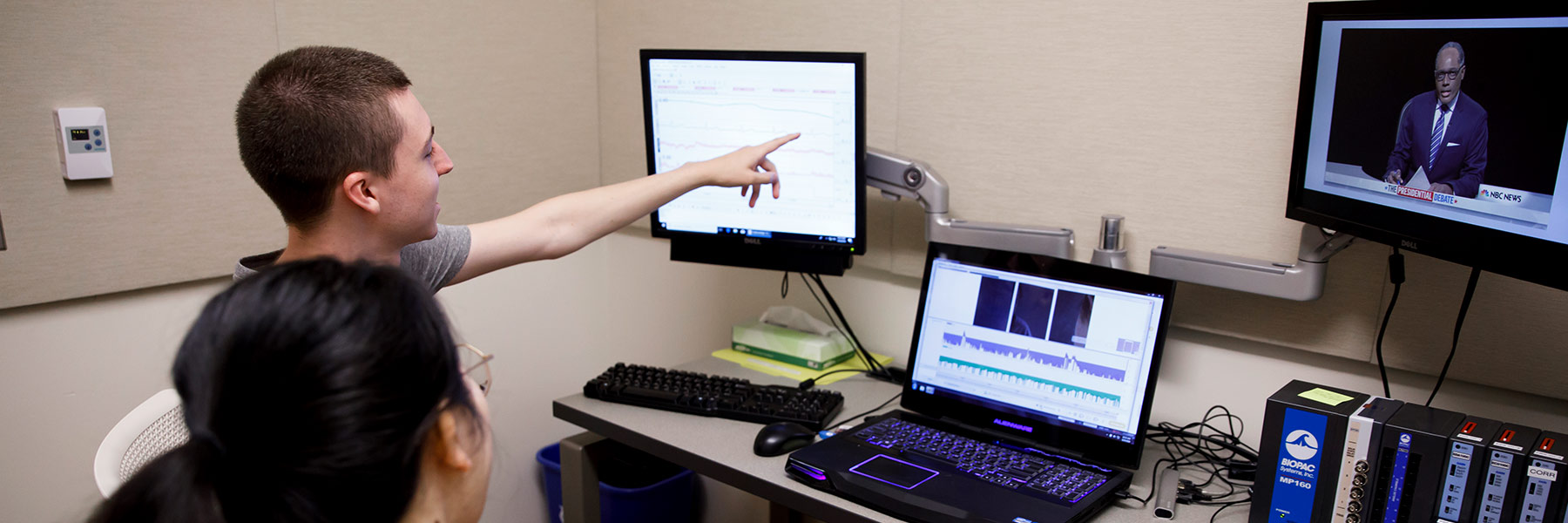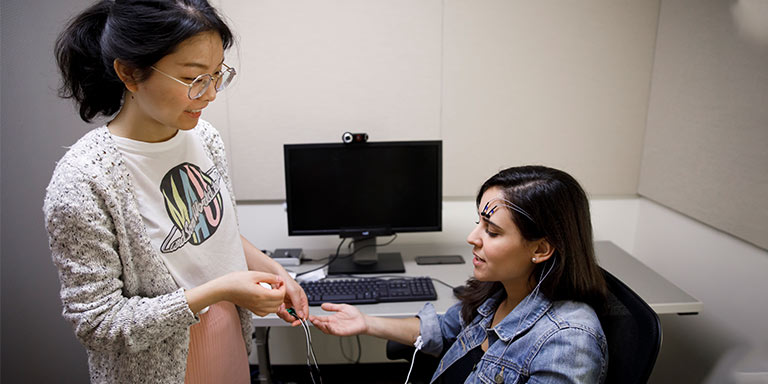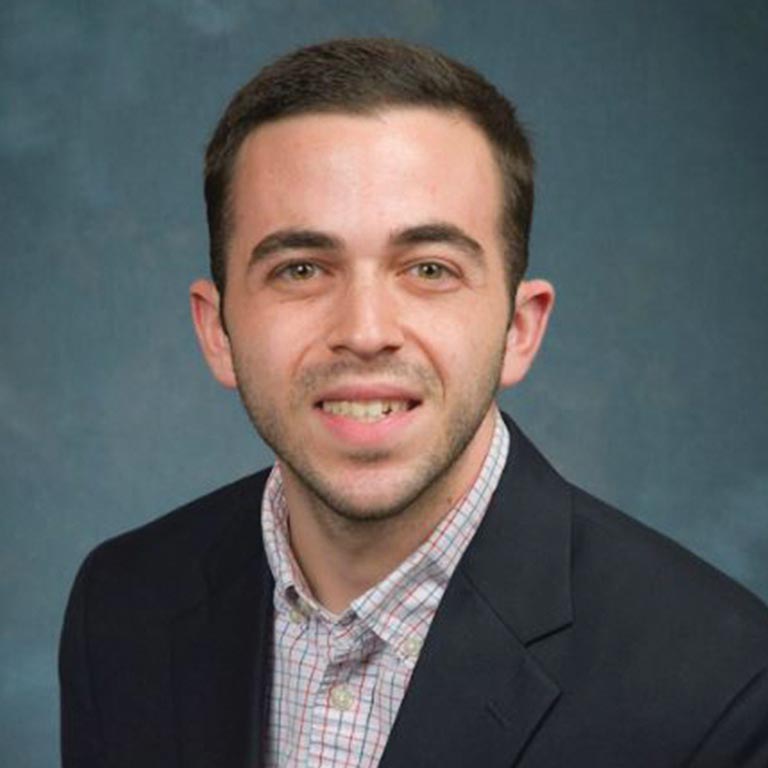Description of the video:
Screen shows interview with Dr. Rob Potter, ICR director.
Potter: Hi, I'm Dr. Rob Potter from Indiana University's Media School. For the past few years, I've been involved in the intensive freshman seminars here at IU or IFS. IFS brings freshmen to campus three weeks before the fall semester starts, and they participate in a three-credit course. My course is called "This Is Your Brain on Media," where students come and they investigate hypotheses of their own about what causes media to increase people's attention and move them emotionally. Here's one project that was done in "This is Your Brain on Media or "TIYBOM."
Black screen.
Screen shows survey of communications lab with computers and desks.
Text: Communications research: A student experiment.
Screen shows interview with student.
Text: What was your group’s research question and hypothesis?
Paige DeFord, TIYBOM student: So our research question was: Will music that had a build up to a beat drop be more arousing than any other type of music?
Screen shows interview with second student.
Lexy Hatch, TIYBOM student: How does rate of music like effect EEG and skin conductance?
Paige: We were just all kind of interested in music and we all felt like, we all listen to music to get hype.
Screen shows Paige drawing a chart.
Paige: So by which music, by which music is the best music to get hype to.
Lexy: We hypothesized that the most intense rate of music would have the biggest skin conductance response. We figured that it was the most like stimulating thing that they were hearing. So we figured that would make them the most like aroused.
Text: How did you go about designing your experiment?
Lexy: So we designed the experiment to happen completely in the dark and we, we eliminated, like most other outside stimuli, or we attempted to, so that the only thing that they were really hearing was the music.
Paige: So I thought all of the music — and we all did — We had instrumental music: We wanted no lyrics because we thought that would be another variable.
Screen shows different music.
Paige: So I have a very just like casual, a little piano music, then I had some that was like heavy metal, and like you could feel the anticipation building and then there was a huge or not really huge, there was a substantial beat drop, or beat change.
Lexy: We tried to eliminate as much sound that they were hearing before the experiment and outside space.
Screen shows ICR sign saying experiment in progress. Screen shows experiment.
Lexy: Then we took them into a completely dark room and we blindfolded them. And we had our tracks playing. It was timed out so that we didn't have to like click any buttons or make any noise for them to play. So that was kinda the design, and then they just listened to the tracks through with like, I think 15 seconds of silence in between to like go back to a regular heart rate.
Screen shows heart bate on screen.
Lexy: Let me think. Our variables, I think our independent variable was the rate of music and then the dependent was the skin conductance.
Paige: We had a couple times where the equipment went wrong, but other than that it ran pretty smoothly once we got the hang of it. We did a good job when we got done fairly quickly. We blocked out like two hours for our experiment, and the we literally did it in like 45 minutes. Text: What was your favorite addition to the design of the experiment?
Lexy: So I really liked what I did with the outtake survey just because I thought it was interesting watching people.
Screen shows an Outtake Survey on a computer.
Lexy: Like even after just a couple of minutes if hearing the sounds trying to remember like their reactions to it and also if they'd heard it before the test, that was like kind of biggest point of the survey was seeing like, do they, have they had any previous exposure to the music? And I thought that was an interesting part.
Text: What did your results show?
Paige: So it showed that music that had a build-up to a beat drop was the best type — is the most arousing for people. So we definitely accepted our hypothesis.
Text: If you could go back and change anything about your experiment, what would it be?
Lexy: I think I would (a) change the songs that we used. The music that we used was perfectly fine. But I think I would find music that there was just like absolutely no way anybody had heard just completely take out that initial bias of like there were a couple of songs that were like instrumental tracks of more popular music.
Screen shows patterns from the experiment.
Lexy: So I think I would eliminate that and I think I would try and isolate the testing space even more because obviously since we were all testing in the labs, there were just people out here.
Screen shows people in the lab.
Lexy: So we tried to keep things quiet, but I think I would try and like keep the process as like sterile and regimented as possible just to eliminate that outside stimulus.
Text: What did you personally take away from IFS?
Lexy: Well, I definitely did meet a lot of like my good friends that I have right now through IFS, that's kind of my main like social group. I also think it was nice to give like a peek at what college was going to be like I'd taken college courses in high school, but this was like actually like on campus doing the work for that. That was interesting. And I hadn't really thought that I was going to be interested in media. Like it's not something that I had really thought about before. But after taking the class, I'm now considering a media minor.
Paige: So coming into IU, I had like, oh, Media School, sure, because I'm doing speech language pathology, but I kind of realized that I wanted to minor in something along the lines of media. So I realized that media and creative advertising is where I'm going for my minor, and it sounds nice too. I definitely learned that I'm more capable than what I thought I was. IFS kind of got me out of my comfort zone. And I kind of realized, hey, I got this. It was a good intro to college. And I was like, you know what, it honestly made college seem harder than it was, which is great. Because when I got to the rest of my classes and I was like, wait, this is not half bad. So it definitely set up my expectations. And it made me realize that I have to work hard and how to actually work hard the right way.
Lexy: It did open some doors, and it taught me stuff I wouldn't have learned without taking the class.
Text: Communications research. Rob Potter, producer/interviewee. Lexy Hatch, interviewee. Paige DeFord, interviewee. Xia Zheng, active listener. Esther Faniyan, writer/interviewer. Jackson Naylor, director/editor.




